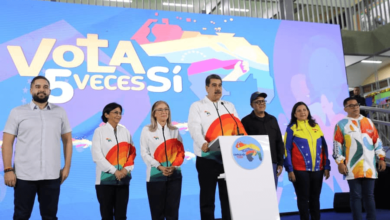At the United Nations annual General Assembly in New York City, Latin American leaders are expressing outrage and total rejection of U.S. imperial policy toward the southern continent and oppressed peoples of the world.
More than 190 member states belong to the UN, but the overriding power resides in the Five-member permanent Security Council. And among those five, the United States wields ultimate power.
One head of state, Venezuelan President Nicolás Maduro, was not present due to mechanical faults in his presidential Airbus plane, as he prepared to travel to China before going to the UN in New York City. He laid responsibility on those plotting against his government, internal and foreign entities directed by the CIA and NSA. The plane had been under maintenance in France for five months. When it returned to Venezuela, a close inspection discovered a major failure in one of the wings.
Maduro instead flew on an Ilyushin IL-96 Russian-made plane that belongs to ALBA, (the Bolivarian Alliance for the Americas), on his trip to China.
As he was flying to China, the U.S. government denied him clearance to fly over alleged U.S. airspace, that of Washington’s illegal colony Puerto Rico.
The setback did not deter Venezuela from sending Foreign Minister Elías Jaua to New York, where he roundly denounced the U.S. government’s rule over the UN for its military and economic objectives. He asked why the UN doesn’t sanction the United States for its blockade of Cuba and bombing threats against Syria.
Jaua endorsed Bolivian President Evo Morales’ proposal on Wednesday, Sept. 25, made before the General Assembly. Morales has called for the United Nations to be moved to another international capital, saying, “We have to change the site of the United Nations because we do not feel safe there.
Morales declared U.S. President Barack Obama deserving of the “Nobel Prize of War.”
US espionage ‘unacceptable’
Brazilian President Dilma Rousseff’s address stood out as she blasted the U.S. government for its spying on her administration and on Brazil’s oil operations, labeling it a “case of grave violations of human rights and civil liberties” and “unacceptable.”
She recently postponed a planned state visit to Washington, in protest of the espionage.
Instead, in the UN, she announced that Brazil will adopt new legislation to restrict internet conglomerates Google, Facebook and other corporations in their Brazil operations.
As the 68th General Assembly session continues, a resolution calling for the United States to end its blockade of Cuba will soon be presented. It is bound to receive unanimous backing, as it has for 21 years. Last year on November 14, 2012, 188 nations voted for the blockade’s end. Only Israel and the island of Palau voted with the United States.
The need for abolition of the veto power of the Security Council and real democratization of the UN has never been clearer, when one sees resolutions against blockades, sanctions on oppressed countries, and for the inalienable rights of the Palestinian people go unheeded, thanks to U.S. and western powers’ control.






